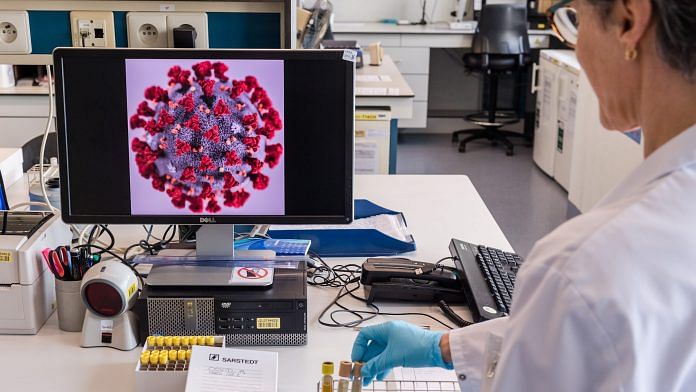New Delhi: India undertook more than 100 clinical trials in the first four months after the Covid-19 pandemic hit the country, a review article published in the Indian Journal of Medical Research (IJMR) has said.
The analysis, conducted by researchers at the Indian Council for Medical Research (ICMR), the apex body in the field, found that of the 122 trials registered in India, more than half were to test the benefits of traditional medicine systems, such as Ayurveda and homoeopathy.
The IJMR is a peer-reviewed online open-access journal published by the ICMR.
Also read: Remdesivir, HCQ, lopinavir & interferon have no effect on Covid patients — Solidarity trial
Which system had most trials?
The trials were registered on Clinical Trials Registry — India (CTRI), which is set up under the ICMR.
The analysis picked out 122 Covid-related trials from over 27,000 registered with the CTRI to present “a concise and comprehensive overview of the pharmacological and clinical aspects of the registered trials”, the IJMR article said.
Of these 122, 42 trials were based on modern medicine (allopathy), 67 on traditional systems of medicine — ayurveda, yoga and naturopathy, unani, siddha, sowa rigpa and homoeopathy, covered under the AYUSH ministry — while 13 were miscellaneous.
Under the AYUSH umbrella, ayurveda accounted for 45 trials, homoeopathy for 14, and the rest had eight combined. Sowa rigpa didn’t have representation.
The 13 trials that have been categorised as “miscellaneous” explore a range of interventions such as nutraceuticals and process-of-care changes, while some address the management of non-Covid patients amid the pandemic.
Objective is to highlight gaps in studies
The review, authored by eight researchers from ICMR and CTRI, intends to showcase the research being conducted on Covid-19 in India and highlight the research gaps to steer further studies.
The analysis/review published on 19 October states: “Notwithstanding the deadly virulence of the SARS-CoV-2 and the enforcement of widespread physical restrictions, medical researchers in India have risen to the dual challenge of caring for the sick and testing potential therapeutic options.
“We hope that this information would help researchers to not only understand the clinical research scenario, but also encourage healthy debate, train researchers to avoid obvious errors or oversights, steer clear of repetitive research and indirectly promote the quality of research in the country.”
The authors highlighted that there was “a wide variation in sample size in the registered trials ranging from 6 to 50,000”. However, they did not clarify if the variation in sample size was a matter of concern or not.
How was the review conducted?
According to the IJMR article, 123 registered Covid-19 trials were extracted from the CTRI database using the term Covid in the different fields of the CTRI data set. “These trials were manually screened and analysed,” the article stated, clarifying that “one trial was excluded because Covid-19 was in the exclusion criteria in that trial”.
The modern medicine drug trials include phytopharmaceuticals, cell- and plasma-based therapies, and biological products. While 28 trials are registered for drugs, 24 trials are on individual drugs which primarily evaluate their therapeutic efficacy, whereas the remaining four are the trials using a combination of drugs.
In the traditional medicines category, “31 trials were prophylactic (for prevention) and 36 were therapeutic (for treatment), mostly conducted on asymptomatic or mild-to-moderate Covid-19 patients”.
Some of the trials registered under the ‘miscellaneous’ category were done to evaluate methods to “minimise infection risks… Other registered trials in this category include efficacy of nutraceuticals, feasibility of developing a novel artificial intelligence algorithm to screen Covid-19, telemedicine and ventilatory management training to ramp up capacity”.
Also read: ICMR recalls statement that said WHO’s Solidarity Trial plans to continue testing remdesivir




TS Darbari – Scientists around the world are working on potential treatments and vaccines for the new coronavirus disease known as COVID-19. Several companies are working on antiviral drugs, some of which are already in use against other illnesses, to treat people who already have COVID-19. Let’s hope that we find a vaccine as soon as possible and the pandemic may be stopped. #TS_Darbari #Ts_Darbari_Blog #TS_Darbari_News #Ts_Darbari_Views #Ts_Darbari_Blogger #TS_Darbari_Comments #Ts_Darbari_Opinion #About_TS_Darbari #TS_Darbari_Articles #Politics #Views #Comments